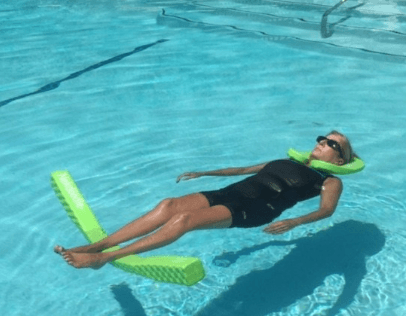News
Healthy Diet Choices for Swimmers
Swimming is a high-intensity sport that requires plenty of fuel for optimum performance. Swimmers rely on excellent nutrition and a healthy diet to support them in their quest to perform their best. Swimmers have considerable energy needs whether they are swimming competitively or simply enhancing their fitness levels. The following diet choices will fulfill swimmers’ dietary requirements and should even enhance their overall health and performance.
Swimmer’s Diet Overview
Swimming works up an appetite, so it is important for swimmers to eat as many as four times a day, but staving off hunger requires attention to the types of foods eaten at a meal. Certain food combinations, for example, can lead swimmers to feel more satisfied as well as more energized. Ideally, the swimmer’s diet should make them feel satisfied for around three to four hours and provide them with the calories they need to perform well and progress in their skills. Along with the right foods, swimmers need to stay hydrated by drinking a lot of water. It is best to avoid sugary sports drinks and juices that offer only empty calories.
Diet Basics
To provide energy and to maintain and build lean muscle, swimmers need to make sure they eat enough from certain food groups to support these needs. Swim experts recommend that swimmers consume grains such as rice, quinoa, pasta, crackers, pretzels, and bread. The lean protein group should include chicken or poultry, beef, pork, fish, beans, eggs, nuts, or tofu. Dairy or non-dairy substitutes like yogurt, milk, soy milk, cottage cheese, and cheese should be part of the swimmer’s healthy diet as well as healthy fats like olive oil, avocados, or vegetable-based oils. Vegetables like potatoes, peas, corn, broccoli, lettuce, and green beans and fruits like fresh, canned, or frozen fruits are musts.
Customizing Your Diet Plan
Every swimmer is different and each body needs a tailored approach to eating. Swimmers who swim daily and train for competition may require a more regimented plan than swimmers who enjoy the sport for leisure. What satisfies one swimmer at meal time may not satisfy another. When planning meals, consider tracking meals and assess how long it takes before hunger sets in. One day, try eating a breakfast of milk and cereal and compare it to a breakfast containing eggs, fruit, toast, and yogurt. Swimmers, like other athletes, will need to carefully assess which foods enhance their performance and also keep them feeling satisfied.
Foods to Include in Swimmer’s Diet
Swimmers can reduce their risk for vitamin and nutrient deficiencies when they eat foods that are rich in vitamins and nutrients. For example, a diet rich in nuts and seeds provides the body with much-needed magnesium, vitamin E, and healthy fats. Drinking 100% orange juice provides the swimmer’s body with vitamin C and folic acid; if fortified, it also offers calcium and vitamin D. Beans provide excellent nutritional value in the form of protein, fiber, iron, zinc, and magnesium; plus, they are versatile and can be added to everything from soups to tacos. Add Greek yogurt to your diet for enhanced digestion; this type of yogurt also yields great stores of protein, vitamin D, calcium, and potassium. Other nutrient-rich foods include dark green, leafy vegetables, milk, low-fat cheese, and fruit.
If you are a swimmer, be sure to carefully consider your diet and plan your meals with nutrient-rich foods. With an optimum diet, your meals can provide you with the nourishment you need to perform at your best. Do not forget your Nekdoodle® every time you hit the water!

